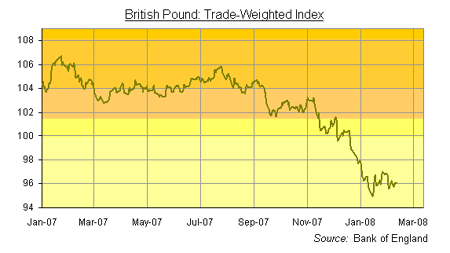Expect more government meddling with banks
If only Alistair Darling and fellow chief policy wonks would stick to talking gibberish, rather than actually trying to put it into practice, says Adrian Ash.
Get the latest financial news, insights and expert analysis from our award-winning MoneyWeek team, to help you understand what really matters when it comes to your finances.
You are now subscribed
Your newsletter sign-up was successful
Want to add more newsletters?

Twice daily
MoneyWeek
Get the latest financial news, insights and expert analysis from our award-winning MoneyWeek team, to help you understand what really matters when it comes to your finances.

Four times a week
Look After My Bills
Sign up to our free money-saving newsletter, filled with the latest news and expert advice to help you find the best tips and deals for managing your bills. Start saving today!
In times of crisis, it's always good to know there are bright, committed people working non-stop to sort things out. Or so everyone seems to believe.
Stormy weather needs strong, decisive characters manning the tiller. Clever people, men of action men like Chancellor Alistair Darling, for instance.
Darling took charge last June when Gordon 'Gold Sales' Brown, promoted himself to Prime Minister of the world's fourth largest economy.
MoneyWeek
Subscribe to MoneyWeek today and get your first six magazine issues absolutely FREE

Sign up to Money Morning
Don't miss the latest investment and personal finances news, market analysis, plus money-saving tips with our free twice-daily newsletter
Don't miss the latest investment and personal finances news, market analysis, plus money-saving tips with our free twice-daily newsletter
It was right around the time Bear Stearns was closing two heavily-leveraged subprime mortgage hedge funds. The Bank of England's policy committee appointed but not directed by the chancellor since New Labour, first came to power 10 years earlier was just about to raise UK interest rates to 5.75%, a six-year high.
And UK house prices offering less than one-third the square footage of the average US home, and with the smallest room sizes in Europe were fast-approaching an all-time peak price of £184,191, some $350,000.

Barely three months later in September 2007, however, the global banking crisis had spread onto Britain's high streets, creating the first open 'banking run' in more than 130 years at Northern Rock one of the nation's top five mortgage lenders.
Darling has clearly been hard at work ever since...fixing everything that let Northern Rock go from £12.29 per share to £0.52 on the stock market a full 95% slump as it soaked up £26 billion ($50.4bn) in emergency loans from the Bank of England.
The G7's men of action
'What you can do at an international level, I believe, is make sure we have better early warning systems,' he told CNBC in a relaxed chat last week after the G-7 summit in Tokyo.
'[We can] make sure that, er, when it comes to, er, off-balance sheet arrangements, or when it comes to the way that credit reference...er, credit rating agencies behave, then there does need to be international co-operation.
A nice slip of the tongue! Credit reference agencies are now busier than ever in the UK, if not internationally, advising the banks on who does and who doesn't represent a 'prime only' risk.
'But of course,' the chancellor went on, 'most banking supervision is a matter for the individual countries concerned. The lesson that I think we need to draw, though, is you need to get the right regulatory systems, supervisory systems, and you've also got to make sure it works.
'Er, and, you know, the system is only as good as the people who are in it, and the key thing is, the prime responsibility for getting these things right lies with the company. It's for a bank to make sure that it knows what its employees are up to, it's for a bank to ensure it's got a business plan that works.'
With it so far? The woman from CNBC sure wasn't. So she asked again without bothering to jab a finger into his chest in the way that a BBC radio or television anchor would at home quite what the British chancellor meant by international action.
'Individually or together,' he replied, 'we need to do everything we can, right across the world, to get ourselves through what is a pretty difficult and uncertain time.'
And with Alistair Darling running the UK finance ministry, the times ahead are only certain to become less pretty and more difficult.
So just what might 'everything' mean for policy going forward?

'Going forward, we will continue to watch developments closely and take appropriate actions, individually and collectively, in order to secure stability and growth in our economies,' the G-7 statement announced.
Which sounds round about as clear and purposeful as Darling's ramblings to CNBC. Which in turn would suit us just fine here at BullionVault...if only the world's chief policy wonks would stick to talking gibberish, rather than actually trying to put it into practice.
Those sterling men Ben Bernanke and Hank Paulson of the United States are now committed along with Japanese finance minister Fukushiro Nukaga, the two Jean-Claudes of the Eurozone (Juncker and Trichet), and assorted policy wonks from Canada, France, Germany and Italy, as well as Darling's own central banker, Mervyn King of the Bank of England to the following course of action:
1. Sell gold
The G-7 thinks now would be a good time for the International Monetary Fund (IMF) to swap Gold Bullion for 'income bearing assets' such as US Treasury bonds.
Or more immediately, in fact, the IMF founded at the end of the Second World War should now be bailed out so it can continue advising poor nations on how to run their budgets.
It's currently running an annual budget deficit of $400 million all of its own. And as our friend Julian Phillips of the Gold Forecaster notes, the IMF's gold doesn't actually belong to the IMF yet. The gold still belongs to the original sponsors of the Bretton Woods currency agreement, an agreement which collapsed in 1971 when US president Richard Nixon cut the dollar free from what remained of the international Gold Standard.
But why let detail get in the way of bailing out a failed institution?
2. If at first you completely screw up...
Speaking to the Nikkei news agency just before the G-7 summit, 'I believe you could make a good case...particularly with the European banks [that] the way they implemented Basel [the international accounting standards agreed in 1988] may have been partially or largely responsible for the conduit and SIV issues,' said Hank Paulson.
Put another way, the former head of Goldman Sachs thinks the last set of pan-national banking rules threw the door open to precisely the 'off-balance sheet' tomfoolery that's led us to the current world banking crisis.
But never let hard-won experience get in the way of cocking things up afresh. Right?
'Not only has liquidity dried up since summer,' as Marine Cole reports for Finance Week, 'making the funding of [special investment] vehicles more expensive, but with the upcoming application of Basel II capital rules next year, banks will have to start setting aside capital for off-balance-sheet vehicles, which they haven't had to do under Basel I.'
Basel II specifically demands that banks match their off-balance sheet risks with some level of funded provision. But the new rules so complex that their implementation has been delayed by more than three years still rely on 'the same flawed approach of using internal risk models, credit rating agencies ratings and some band aid capital charges,' notes Nouriel Roubini in his Global EconoMonitor blog.
So what to do? 'There are a number of things that are being looked at,' says Paulson, the poacher-turned-gamekeeper. 'Rating agencies are one of them. We're looking at the mortgage underwriting, origination process in the US, looking at securitisation, looking at evaluation and accounting issues and capital issues.'
Nothing is safe, in other words, from the new slew of regulation about to hit the world's banking sector. Which will only increase fear and uncertainty on Wall Street and in the City the perfect policy outcome now that banking confidence has shrunk to nothing.
3. Bail out anything and everything
Within days of returning from Tokyo, Alistair Darling finally took the only course of action he thought left open to him, and he nationalised the failed Northern Rock.
Shareholders are apoplectic not least those shareholders who bought into the new People's Bank of Great Britain during its 95% plunge, hoping to turn a quick buck on the bounce.
If current investors aren't given full value when Northern Rock is re-privatised, 'the British government's actions would amount to robbery under the law,' wails Tim Congdon, an otherwise highly respected (and apparently sentient) economist. He pleads in the Financial Times that simply letting the Rock go under was never an option.
'Central banks exist for the purpose of preventing [banking] runs or, at any rate, ensuring that runs are met by lender-of-last-resort loans so the hurried liquidation of assets can be avoided.'
Help me when I screw up, in short, but don't interfere when I think I've been clever. Which in the bigger scheme of things underpinning the British public's faith in the security of its banking deposits if just what nationalising Narodny Rock will do.
'If US policymakers want to avoid a recession,' writes David Bowers of Absolute Research Strategy also in the Financial Times 'they need to ensure that America's $750bn annual funding requirement from overseas is assured, and at a reasonable price.'
How to keep money flowing into the US financial sector so that its very real-world trade deficit doesn't implode? 'We believe they should move more rapidly to restore confidence in credit ratings and, thus, in securitised paper,' says Bowers. 'This could be done through more regulatory oversight of the ratings agencies.
'As a last resort, the government could even 'share' its credit rating with key private sector operators such as the [ailing bond insurance] monolines' which is precisely what nationalising Northern Rock achieves for the failed UK mortgage lender.
Expect ever-more government meddling in short, begged for by the Western world's finance industry and willingly supplied by policy-makers desperate to appear decisive.
And for as long as this circus keeps rolling on, you might want to keep buying gold as defence.
The men of action, after all, are trying to sell it.
Adrian Ash is editor of Gold News and head of research at www.bullionvault.com
Get the latest financial news, insights and expert analysis from our award-winning MoneyWeek team, to help you understand what really matters when it comes to your finances.
Adrian has written all things gold related from if it’s worth buying, what the real price of gold should be and what’s the point of gold for MoneyWeek. He has also written for other leading money titles on his gold expertise including Business Insider, Forbes, City A.M, Yahoo Finance and What Investment Magazine. Now Adrian is head of the research desk at BullionVault, a physical market for gold and silver for private investors online.
-
 New PM Sanae Takaichi has a mandate and a plan to boost Japan's economy
New PM Sanae Takaichi has a mandate and a plan to boost Japan's economyOpinion Markets applauded new prime minister Sanae Takaichi’s victory – and Japan's economy and stockmarket have further to climb, says Merryn Somerset Webb
-
 Plan 2 student loans: a tax on aspiration?
Plan 2 student loans: a tax on aspiration?The Plan 2 student loan system is not only unfair, but introduces perverse incentives that act as a brake on growth and productivity. Change is overdue, says Simon Wilson